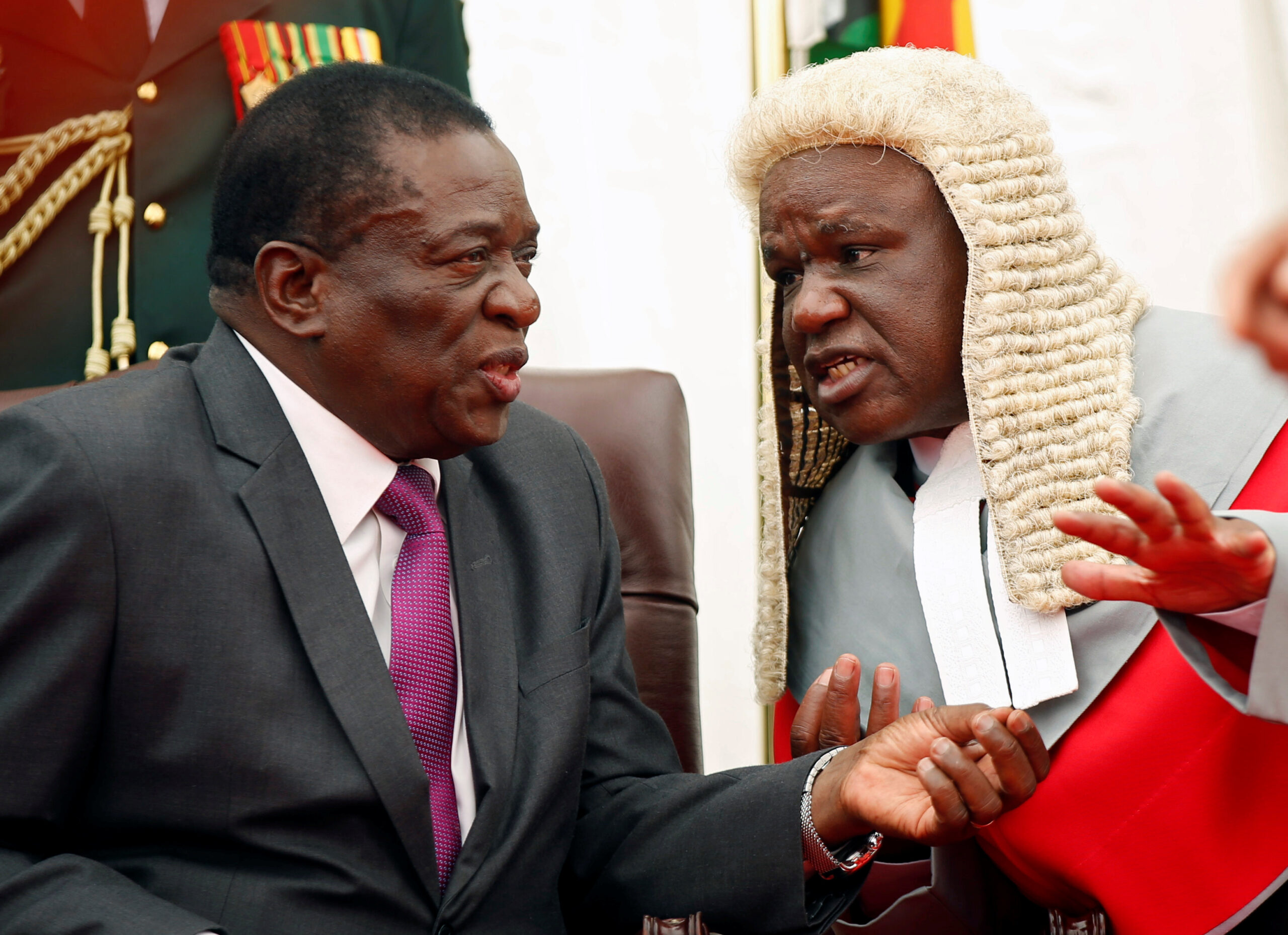THE recent gifting of US$400 000 housing loans to judges has underlined the executive’s keenness to extend favours to the judiciary, particularly during elections, as they play a key role in mediating disputes.
NATHAN GUMA
The 2018 presidential election was adjudicated by the Constitutional Court which found for President Emmerson Mnangagwa after Chief Justice Luke Malaba controversially threw out a challenge to the poll result by main opposition leader Nelson Chamisa.
Through Constitutional Amendments No. 1 and 2, President Mnangagwa did all he could to ensure that Malaba retains office, despite having reached retirement age.
While judges have also been extended US$400 000 loans each to buy property, the arrangement had initially been tailor made for Chief Justice Malaba and his deputy Elizabeth Gwaunza.
Generally, judges are well looked after, and they get top-of-the-range cars from Premier Auto, an importer and distributor of Jaguar and Land Rover in Zimbabwe.
As previously reported by The NewsHawks, Mnangagwa has also been lavishing money on state institutions in a desperate bid to appease critical players in the election matrix.
In January last year, Mnangagwa gave each senior Central Intelligence Organisation (CIO) director a US$350 000 housing loan.
The CIO plays a critical role in electoral processes including voter registration, voters’ roll preparation, pre-polling surveys, and generally being embedded in electoral bodies to monitor and influence processes, accreditation and getting the results well ahead of everyone else for security and partisan reasons and ensuring they decide on time how to handle situations, especially if there is an unwanted outcome.
State security has also taken over the running of elections through shadowy Forever Associates Zimbabwe (Faz), led by Central Intelligence Organisation co-deputy director-general retired Brigadier-General Walter Tapfumaneyi.
Faz has now displaced the army’s structure called Heritage that used to perform a similar role and other functions.
In 2018, the army ran elections through Heritage and Africom, a converged communications service provider. Legal experts say the CIO move and channelling of public resources to its shadowy structure is unconstitutional.
Sources say, so far, Faz has received US$10 million and 200 cars to run its affairs in preparation for the 23 August elections.
More resources have been promised to capacitate the secret structure. Faz’s mandate, working together with the Zimbabwe Electoral Commission (Zec) and its chair Justice Priscilla Chigumba, is to coordinate logistics and decisive forces to retain Mnangagwa in power.
Last week, Faz took over the chaotic voter verification exercise, in which several registered names were missing from various wards across the country. The CIO has also been manipulating elections on behalf of Zanu PF. In 2008, a local journalist exposed a major electoral scandal in which the CIO worked with a top University of Zimbabwe academic to produce election surveys which were then falsely announced as a product of scientific scholarly research to manipulate elections.
In that case, the CIO had produced the report and given to the academic to announce as his own, predicting victory for the late president Robert Mugabe.
The first CIO draft report had actually shown Mugabe losing, but it was considered politically unacceptable and a new one was done, giving him marginal victory over the late main opposition MDC candidate Morgan Tsvangirai.
As things turned out, Tsvangirai actually defeated Mugabe in the first round of polling with 47.87% (which many believed was suppressed to ensure a run-off) to 43.24%.
The CIO and other security forces have agents embedded in the whole electoral process, including at Zec, particularly at secretariat level. The Zec secretariat is headed by Utloile Silaigwana, who was in the army.
He took over as chief elections officer from the late Lovemore Sekeramayi, a former top CIO officer. Mnangagwa has also sought to capture ministers and parliamentarians.
In December last year, Mnangagwa pampered legislators and his cabinet ministers with loans ranging between US$40 000 and US$500 000 in order to avoid protest votes, commonly known as bhora musango, from within Zanu PF as well as win over the delicate intra-party factional fight with his deputy Constantino Chiwenga, Zanu PF legislators said.
The government gave legislators US$40 000 loans each while deputy ministers pocketed US$350 000 and ministers US$500 000.
Sources told The NewsHawks that the loans — far from cushioning MPs let alone the ministers who already enjoy hefty perks that include an all-terrain vehicle and a Mercedes-Benz sedan — are designed to achieve a sinister political purpose.
“It is all about the 2023 elections and Number One’s [Mnangagwa] political strategy to hold onto power and push back any attempts at bhora musango [internal sabotage] by disgruntled MPs who have for long complained about poor conditions of service,” said a Zanu PF legislator.
“There were fears in Number One’s mind that the Zanu PF MPs with influence from the Chiwenga camp would campaign just for themselves and encourage protest votes for him. The Chiwenga faction wanted to pursue this line by convincing the MPs that there was no point in supporting a leader who cares only for himself and his children who are into various murky deals than them in Parliament and cabinet.”

